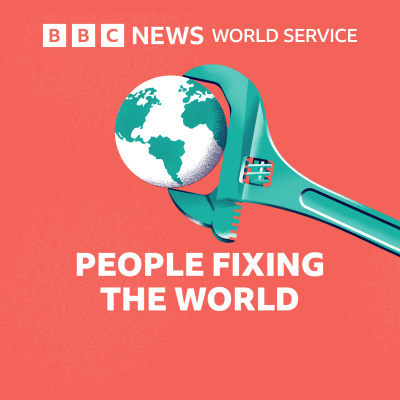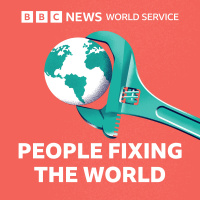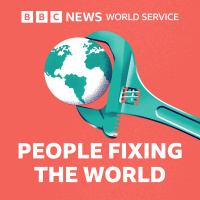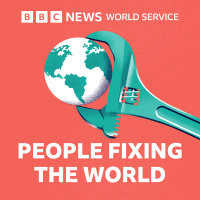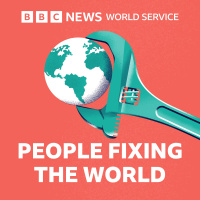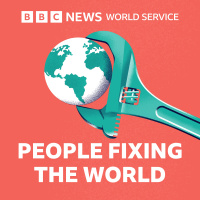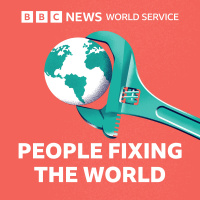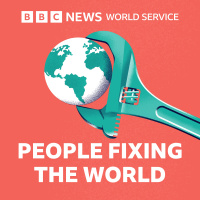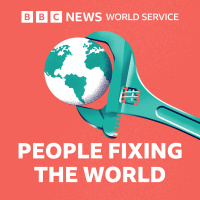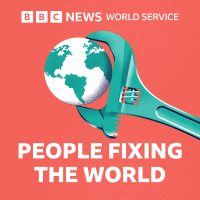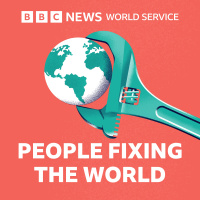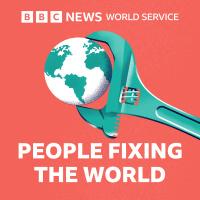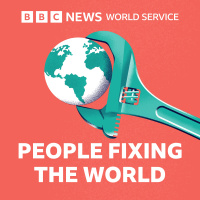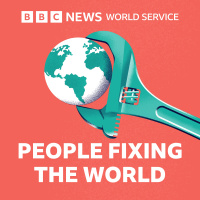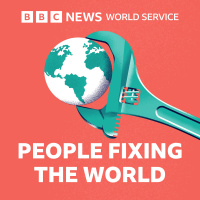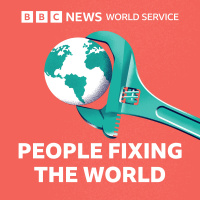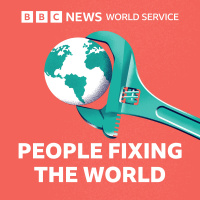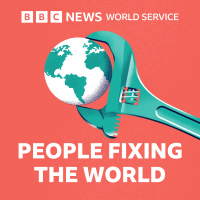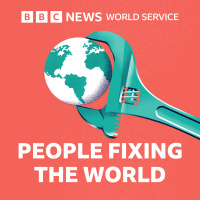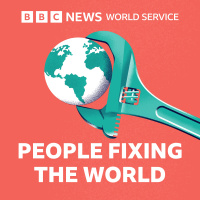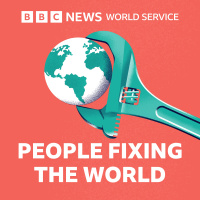Sinopsis
Brilliant solutions to the worlds problems. We meet people with ideas to make the world a better place and investigate whether they work.
Episodios
-
Jobs for girls
15/11/2022 Duración: 25minHow hard is it for women to break into male-dominated jobs? We look at two projects which are helping women to increase their earnings by training them in forms of work that have traditionally been done by men. In Uganda, we meet the woman training girls in careers from mechanical engineering and welding to carpentry and construction And in India, we visit the college that trains impoverished women from around the world in the nuts and bolts of solar technology. As well as the economic benefits, by challenging the status quo these projects are also aiming to empower women and change society.Presenter: Myra Anubi Reporter/Producer: Farhana Haider India Reporter: Chhavi Sachdev Series producer: Tom Colls Sound Mix: Hal Haines Editor: Penny MurphyEmail: peoplefixingtheworld@bbc.co.ukImage: Smart Girls Uganda students working on a car, Kampala.
-
COP27: Growing a forest the right way
08/11/2022 Duración: 24minTree-planting schemes don’t always work, so what’s the best way to do forest restoration?Projects around the world are planting huge numbers of trees as part of the fight against climate change. But not all of these schemes are successful – leaving dead saplings and wasted money in their wake. People Fixing the World works out how to do it right. In West Africa, we look at how farmers have reforested and restored huge areas without planting a single seed. In Brazil, we visit a project that has planted more than 600,000 trees in the endangered Atlantic Forest. Myra Anubi also hears about new satellite technology which can help us map reforestation across the world, to give a clearer picture of what is and isn’t working when it comes to growing trees.Presenter: Myra Anubi Reporter: Julia Carneiro Producers: Zoe Gelber and William Kremer Series producer: Tom Colls Sound mix: Hal Haines Editor: Penny MurphyEmail: peoplefixingtheworld@bbc.co.ukImage: A sapling (Getty Images)
-
Picking up healthcare with the litter
01/11/2022 Duración: 23minWould you pick up litter if your life depended on it? Around the world, companies and governments are trying to incentivise people to pick up litter and recycle their waste. In Nigeria, we visit the tech start-up which encourages people to pick rubbish up off the street – and then swaps the plastic bottles, cartons and metals they collect for potentially life-saving healthcare.And in Turkey, we meet the mayor on a mission to get his residents recycling, by exchanging their household waste for points that earn them money. Presenter: Myra Anubi Reporters: Craig Langran and Kareemot Salami Producer: Jo Casserly Series producer: Tom Colls Sound mix: Hal Haines Editor: Penny MurphyEmail: peoplefixingtheworld@bbc.co.uk Image: Recycling in Turkey
-
Albatrosses and oysters fixing the world
25/10/2022 Duración: 24minGiant seabirds and shellfish are being used to help protect our planet.On an tiny island in the remote Southern Ocean, a French researcher wanted to find out why so many birds were being killed by fishing boats.By attaching radar loggers to Albatrosses, he inadvertently invented a powerful method for tracking down illegal vessels.And in New Orleans in the US, a restaurant owner is recycling tonnes of old oyster shells.They’re being put back in the ocean to protect the shoreline and create new reefs so more oysters can grow.Presenter: Myra Anubi Reporter: Anna Adams Producer: Zoe Gelber Series producer: Tom Colls Sound mix: Hal Haines Editor: Penny MurphyEmail: peoplefixingtheworld@bbc.co.uk Image: An albatross (Getty Images)
-
Educating refugees
18/10/2022 Duración: 24minHow do you help young displaced people get a better start in life?Young people who become refugees often have their education disrupted – which can have a serious impact on their future prospects. But we find out about two schemes that are trying to help. In Jordan, a charity has developed a high school curriculum specifically aimed at young people who are displaced. Amala enables 16-25 year olds to complete their secondary education, and also develop skills that will help their community. And when it comes to further education another organisation in Canada has been helping young refugees. The Student Refugee Program run by the World University Service help them to study at Canadian universities and then settle in the country. We speak to a student who’s been through the scheme, and to one of the volunteers who helped them.Presenter: Myra Anubi Reporter: Lucy Burns Additional production: Craig Langran Series producer: Tom Colls Sound mix: Gareth JonesEditor: Penny MurphyEmail: peoplefixingtheworld@bbc.co
-
Sustainability in death
11/10/2022 Duración: 24minA growing number of people are looking for ways to be sustainable in death as well as life. We look at the latest end-of-life options aiming to be more environmentally friendly.From the company making compost of our human remains in the US to the so called ‘greenatoriums’ in India that are offering people a greener alternative to traditional cremations.Presenter: Myra Anubi Reporter/Producer: Farhana Haider Reporter in Lucknow: Mohammed Usman Series producer: Tom Colls Sound mix: Gareth Jones Editor: Penny MurphyEmail: peoplefixingtheworld@bbc.co.uk Image: Recompose, a human composting facility in Seattle.
-
Ending road deaths
04/10/2022 Duración: 24minRoad traffic injuries are the eighth biggest cause of death in the world, with about 1.3m people killed every year.But 25 years ago, a movement started that changed the way policy-makers approach the issue. Vision Zero imagines a world in which no-one is killed or seriously injured on our roads. Its advocates say this isn’t a utopian ideal, but a mindset with numerous practical implications, and which has cut deaths in a number of countries.Myra Anubi also hears about an innovative project to help truck drivers in India stay safe on the roads, and checks out the tech that now comes fitted in all new cars models in the EU - and which experts say could eliminate a fifth of road casualties.Presenter: Myra Anubi Reporters: William Kremer and Chhavi Sachdev Producer: Zoe Gelber Series producer: Tom Colls Sound mix: Hal Haines Editor: Richard Fenton-SmithEmail: peoplefixingtheworld@bbc.co.uk Image: Stop sign (Getty Images)
-
Dads on duty
27/09/2022 Duración: 24minWhen 23 pupils were arrested after a series of fights at a school in the US city of Shreveport, a small band of parents decided to help the beleaguered teaching staff regain control. Step forward the ‘Dads on Duty’. They are a group volunteer fathers who patrol the corridors and playgrounds with a friendly smile and a few dad jokes. Their presence gives the kids some positive male role models and demonstrates an alternative to gang culture.Plus, we take another look at a scheme that tackles bullying by bringing a baby into the classroom. Roots of Empathy believe that caring for a baby will reduce aggression amongst young children and help them to become better citizens.Presenter: Myra Anubi Producer/Reporter: Ben Wyatt Producer: Richard Kenny Picture: Dads on Duty
-
The food waste warriors
20/09/2022 Duración: 24minAt least a third of food grown around the world fails to be eaten, with the resulting food waste causing 10 per cent of global carbon emissions. However, there are pioneers trying to tackle different issues along the chain.We visit a project linking farmers direct to customers in Puerto Rico, check out smart labels that extend the shelf life of food by revealing when food actually goes off, and revisit an app where millions of people share spare food for free.Presenter: Myra Anubi Reporter/Producer: Jo Mathys Reporter/Producer: Claire Bates Producer in Puerto Rico: Adriana De Jesus Producer: Richard Kenny Series producer: Tom Colls Sound mix: Hal Haines Editor: Penny MurphyImage: Crystal Díaz
-
How to get people eating less meat
13/09/2022 Duración: 24minFarming animals for meat has a massive environmental impact, both in terms of land use and carbon emissions. But in order for people to eat less meat, they need to be excited about the alternatives. Around the world, people are coming up with ingenious meat replacements that look, taste and smell more like the real thing than ever. In Switzerland, we visit the perfume company that’s now turned its hand to perfecting the flavour in veggie burgers. And in Nigeria we meet the entrepreneur who has devised an alternative to beef and chicken that he hopes will appeal to West African tastes. Plus, we speak to the start-up in Israel that’s making kosher veggie ‘meat’ using a 3D printer. Presenter: Myra Anubi Reporter/Producer: Craig Langran Producer: Lucy Burns Picture: Vegan burger (Getty Images)
-
Robots on the beat
06/09/2022 Duración: 24minPolice forces in the US are turning to futuristic technology to tackle a rise in violent crime and murder across the country. In one area of California, they are even using robots to patrol the streets. There, the police are claiming it's led to a reduction in crime and an increase in arrests. In New York they even experimented with a robot police dog, but with mixed results. This and other cutting-edge technologies are helping the police – and the public - stay one step ahead, but they are often controversial. In this programme we look at the some of the best ways that technology can make the streets safer. Presented and produced by Ben Wyatt Image: The Robocop K5Repeat - first published 5 October 2021
-
Hands-Off Health Tech
30/08/2022 Duración: 24minWe look at two new pieces of health technology which allow medics to treat people without touching them. Breast cancer fatality rates in India are higher than in other countries because women are often reluctant to go for screening. A start up called Niramai wants to change this. They use thermal imaging and machine learning to screen for breast cancer without patients having to be seen or touched by a doctor. Plus, we hear about a new company using augmented reality to connect surgeons in operating theatres around the world. Proximie allows medical professionals to help or observe surgery in progress from anywhere on their computer or tablet. It’s already been deployed in 500 hospitals.Presenter: Jo Mathys Reporters: Chhavi Sachdev and Lucy Burns Produced by Lucy Burns for the BBC World Service. Picture: Remote operation (credit: Proximie)
-
What 3D printing can fix
23/08/2022 Duración: 24minThe ability to print objects in three dimensions has been heralded as the solutions to many problems. We check out some of the latest innovations. In Jordan we hear from the doctors who are printing prosthetic arms for people injured in conflict. In the UK we meet the man fitted with the world's first 3D printed eye. And we find out how an Egyptian inventor is using 3D printing to help blind children in the classroom. Presenter: Jo Mathys Producer/reporter: Claire Bates Additional reporting: Toka Omar and Suzanna Goussous (Picture: A 3D printer prints a sphere. Getty Images)
-
Fighting fashion waste
16/08/2022 Duración: 24minOur desire for new clothes creates a lot of waste and much of it ends up in landfill. But a lot of that discarded material can be turned into something useful. We hear from the people in Ghana who are taking old clothes that are sent from Europe, and turning them into pillows, doormats and mops. In Italy, we visit the company making affordable clothes out of fabric that luxury fashion brands don't want. And we meet the Chilean entrepreneur who's turning clothes that are dumped in the desert into insulation for houses.Presenter: Myra Anubi Producer/Reporter: Craig Langran for the BBC World Service. Photo: Kantamanto Market, Accra (Yayra David Agbofah/The Revival)
-
How to fix democracy
09/08/2022 Duración: 24minPolitics in the age of social media can often be angry and divisive. And many people feel their voices aren’t being heard by those in power. But Polis is an online platform that’s trying to make democracy work better. It helps people to reach a consensus even on very polarising issues. We visit Taiwan where it’s been used to draft more than 20 laws and regulations. And in the UK, we see how Polis is helping to sort out difficult local issues. Presenter: Myra Anubi Reporter: Carl Miller Produced by Shiroma Silva and Richard Kenny for the BBC World Service. Picture: Getty Images
-
Getting refugees out of tents
02/08/2022 Duración: 30minMore than 100 million people have been forcibly displaced from their home around the world – fleeing conflict, natural disasters or persecution. Millions end up in refugee camps, living in tents.Around the world, designers and architects are trying to improve the lives of these displaced people, by improving the temporary homes they’re living in.From prefabricated shelters made using Swedish flat-pack design methods, to the homes made from scratch using local knowledge and materials, we meet the people trying to replace tents with homes that have a little more dignity.Presenter: Myra Anubi Reporter/Producer: Farhana Haider Producer: William Kremmer Syria Producer: Ali Haj Suleiman Production Co-ordinator: Ibtisam Zein Sound mix: Hal Haines Executive producer: Tom Colls Editor: Penny MurphyPhoto credit Ali Haj SuleimanDescription Kafirjalas IDP camp Idlib, Syria
-
Using finance to fight homelessness
26/07/2022 Duración: 24minBank accounts and clever investment schemes are being used to help improve the lives of homeless people. In the UK, a number of banks have started offering accounts to homeless people - which until recently were only available to people with a fixed address. Having a bank account can be a crucial turning point, and we meet a disabled homeless person in one of Britain's biggest cities, who's now able to receive welfare payments as a result. We also hear from the city of Denver, Colorado, in the United States, where investors were invited to finance a scheme to house people classed as ‘chronically’ homeless. If the scheme succeeded in saving money for the City council by keeping those people out of Emergency Rooms and police cells, the investors would get their money back - if the initiative failed, they'd lose their cash. Find out what happened on People Fixing the World. Presenter: Myra Anubi Reporter: Daniel Gordon Production Co-ordinator: Ibtisam Zein Sound mix: Hal Haines Editor: Penny Murphy I
-
Saving kids with cancer
19/07/2022 Duración: 24minIf your child develops cancer and you live in a wealthy country there’s a really good chance they will survive - more than 80%. If you live elsewhere, the chances are much lower - less than 30%.Over a decade ago, Dr Mae Dolendo set up a centre in the Philippines to treat children with cancer. Since then she’s saved the lives of hundreds of children who’ve received treatment for free. Now others are replicating her trailblazing hospital. We head to the Philippines to meet Dr Dolendo and see how she’s linking up with St Jude’s paediatric cancer team in the US — one of the best of its kind in the world. Doctors from the team provide expertise remotely, enabling Dr Dolendo to save lives for a fraction of what it would normally cost.Presenter: Myra Anubi Reporter: Micaela Papa Producer: Jo Mathys Production Co-ordinator: Ibtisam Zein Sound mix: Hal Haines Executive producer: Tom Colls Editor: Penny MurphyImage: Dr Mae Dolendo
-
The power of group therapy
12/07/2022 Duración: 27minTherapy has been helping Boko Haram survivors and street youth in Liberia turn their lives around. In northern Nigeria, a programme called Counselling on Wheels is offering mobile mental health services in remote and dangerous areas. They’ve been giving Boko Haram survivors and others affected by conflict a safe space to talk about the horrific violence and trauma they have been exposed to. In Liberia, a project called Sustainable Transformation of Youth in Liberia has been using cognitive behavioural therapy and a cash reward to turn young men away from crime. A new study has shown the scheme is working. Presenter: Myra Anubi Producer/reporter: Lucy Burns Liberia producer: Massa Kanneh Production Co-ordinator: Ibtisam Zein Sound mix: Hal Haines Executive producer: Tom Colls Editor: Penny Murphy Image: Counselling on Wheels (Credit: Neem Foundation)
-
Keeping medicines cool
05/07/2022 Duración: 24minHow enzymes and earthen pots could help keep medicines safe. Access to life-saving medicines often relies on a complex system known as the cold-chain – the refrigerated lorries, store rooms and fridges, which keeps them at the right temperature from the factory to the patient. However, a traditional cold chain runs on electricity- meaning that it’s often difficult to keep medicines and vaccines cold for long enough to reach the remote places and look after them when the electricity supply is intermittent. The food we eat also relies on the cold chain to keep it cool from the farm until it reaches our plates. We meet some of the inventors and entrepreneurs working on cooling solutions, from using enzymes from a special bacteria that make water freeze at a higher temperature, to the earthen pots keeping insulin cool in India. Presenter: Myra Anubi Producer/Reporter: Craig Langran Reporters: Mayank Prakash Bhagwat, Daniel Ominde Production Co-ordinator: Ibtisam Zein Sound mix: Andy Mills Executive prod
